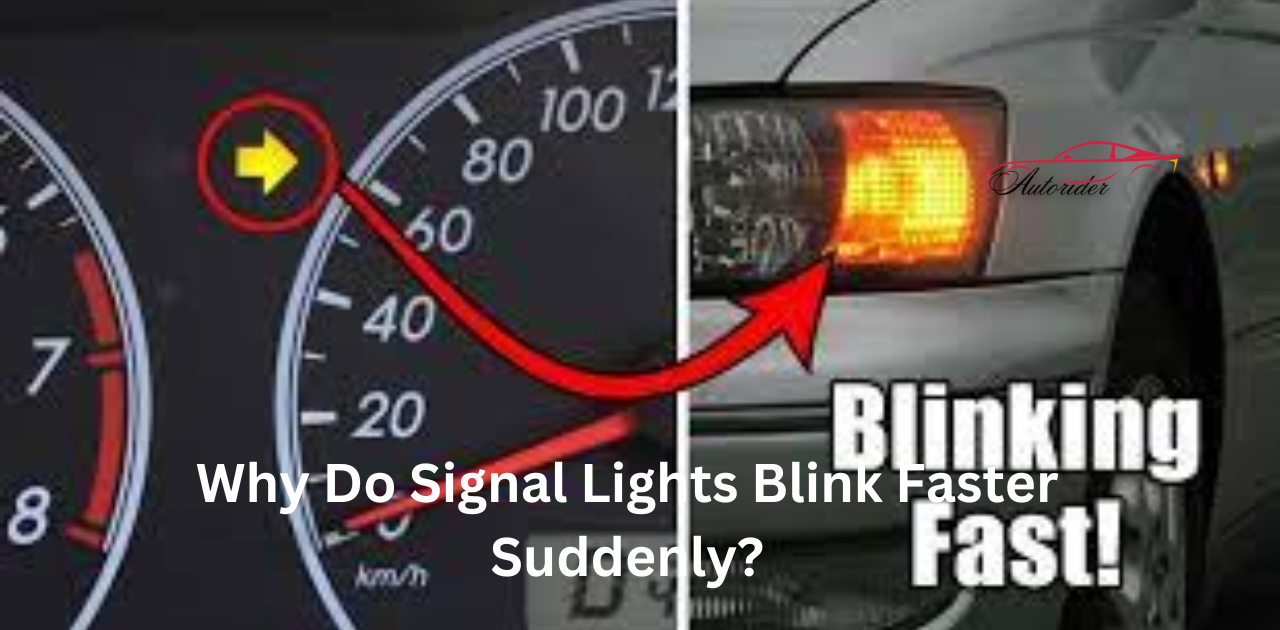Why Do Signal Lights Blink Faster Suddenly? One day, you’re driving your car, and you notice that your turn signal lights are blinking much faster than usual. You might wonder why this is happening, as it’s not the norm. Well, there are a few reasons why signal lights blink faster suddenly. In this article, we’ll explore why this happens and what you can do to fix the issue.
Reasons Why Signal Lights Blink Faster Suddenly:

- Burnt-out bulb: One of the most common reasons for signal lights blinking faster suddenly is a burnt-out bulb. When a bulb burns out, it causes the remaining bulbs in the circuit to use more power, thus speeding up their blink rate. You can easily identify a burnt-out bulb by inspecting the lights’ exterior and interior. If you see a broken filament or discolored bulb, it’s time for a replacement.
- Loose Connection: Another common cause of increased blink rate is a loose connection in the circuit. When the connection is loose, the bulb doesn’t receive adequate power, causing it to blink faster than usual. A simple solution to fix this issue is to make sure all the connections are tightened correctly. If the connection is damaged, you may have to replace it.
- Electrical Load: The electrical load of the circuit can also affect the blink rate. The electrical load of the circuit can change due to several factors, including the use of LED bulbs, the addition of aftermarket parts, and the installation of larger-wattage bulbs. When the electrical load changes, it requires the circuits to work harder, resulting in a faster blink rate. To fix the issue, you might have to replace the bulbs with ones that can handle the higher load, or you may need to install a resistor to stabilize the electrical load.
- Corroded or Damaged Wiring: corroded or damaged wiring can also affect the blink rate of the signal lights. When the wires are corroded or damaged, it can create resistance, causing the circuit to work harder, thus increasing the blink rate. To fix this issue, you may need to replace the corroded or damaged wiring.
- Faulty Flasher Unit: The flasher unit is an essential component of the signal light circuit. It controls the blink rate of the light and can cause the lights to blink faster than usual if it’s faulty. If you suspect that a faulty flasher unit is causing the issue, you’ll have to replace it.
- Dirty Contacts: Over time, the contacts in the circuit can become dirty or corroded. Dirty or corroded contacts can decrease the conductivity of the circuit, causing the signal lights to blink faster. You can fix this issue by cleaning the contacts with a wire brush or replacing them if necessary.
- Low Voltage: Low voltage can also affect the blink rate of the signal lights. When the voltage is low, the circuit has to work harder, causing the lights to blink faster than usual. You can fix this issue by checking the battery voltage, replacing the battery if necessary, or adding a voltage stabilizer.
How to Fix the Issue

- Replace the Burnt-Out Bulbs: As discussed earlier, burnt-out bulbs are one of the most common reasons why signal lights blink faster. Replacing the burnt-out bulbs with new ones is the simplest solution to fix the issue.
- Tighten Loose Connections: You can fix this issue quickly by making sure all the connections are tightened correctly. If there is a damaged connection, you might have to replace it.
- Install a Resistor: Installing a resistor can help stabilize the electrical load and prevent the lights from blinking faster. You can either install a load resistor or a combined turn and brake flasher resistor.
- Replace Corroded or Damaged Wiring: If corroded or damaged wiring is causing the issue, you’ll have to replace the wiring to fix the issue.
- Replace the Faulty Flasher Unit: If the flasher unit is causing the issue, you’ll have to replace it. In some cases, it might be necessary to replace the entire signal light assembly.
- Clean the Contacts: Dirty contacts can be easily fixed by cleaning them with a wire brush. If this doesn’t work, you may have to replace them.
- Check Battery Voltage: Check the battery voltage to make sure it’s not causing the issue. If necessary, replace the battery or add a voltage stabilizer.
Conclusion
Signal lights blinking faster suddenly can be a frustrating issue to deal with, but it’s usually easy to fix. Identifying the issue and replacing the necessary components can restore the blink rate to normal levels. Remember, regularly checking your vehicle’s turn signal lights can help you avoid any unfortunate situations that can arise from a malfunctioning signal light.
FAQs: Why Do Signal Lights Blink Faster Suddenly?
Q: Why are my signal lights blinking faster than usual?
A: There are several possible reasons for signal lights blinking faster suddenly. It could be due to a burnt-out bulb, loose connections, changes in the electrical load, corroded or damaged wiring, a faulty flasher unit, dirty contacts, or low voltage.
Q: How can I identify a burnt-out bulb?
A: To identify a burnt-out bulb, inspect the exterior and interior of the signal lights. Look for a broken filament or a discolored bulb. If you see any signs of damage, it’s time to replace the bulb.
Q: How can I fix loose connections?
A: To fix loose connections, ensure all the connections are tightened correctly. If the connection is damaged, it may need to be replaced.
Q: What can I do to stabilize the electrical load?
A: If changes in the electrical load are causing the issue, you may need to replace the bulbs with ones that can handle the higher load or install a resistor to stabilize the electrical load.
Q: How can I fix corroded or damaged wiring?
A: Corroded or damaged wiring can be fixed by replacing the corroded or damaged sections of the wiring.
Q: How do I know if the flasher unit is faulty?
A: If you suspect a faulty flasher unit, the best way to confirm is by replacing it. If the issue is resolved after replacing the flasher unit, then it was indeed faulty.
Q: How do I clean the contacts?
A: Use a wire brush to clean the contacts. Gently scrub away any dirt or corrosion. If cleaning doesn’t work, the contacts may need to be replaced.

